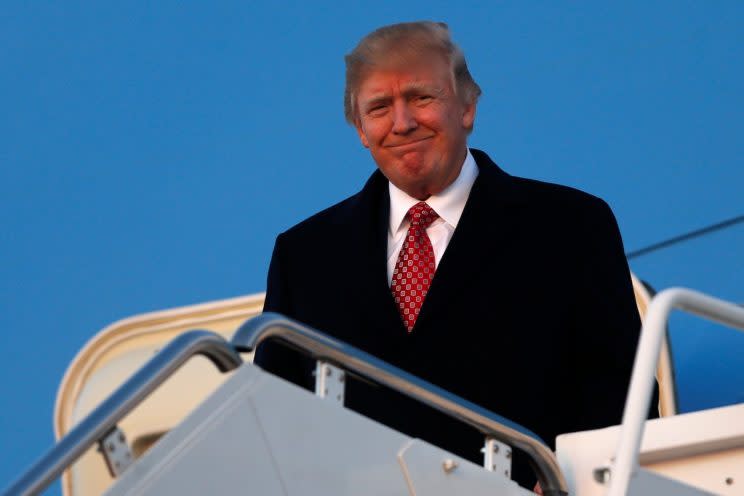Trump’s new travel ban drops ‘religious minority’ language
WASHINGTON — President Trump signed an executive order Monday significantly scaling back his original travel ban from January. The new order drops language that privileges “religious minorities” in refugee admissions from Syria and other countries.
The new executive order goes into effect on March 16.
Trump’s January executive order was blocked nationwide by a federal judge in Washington for potentially encouraging unconstitutional religious discrimination. That case is still winding its way through the courts.
Among other things, the original executive order called into question the U.S. visas and green cards of people from seven majority-Muslim countries, including Iraq and Syria, while also suspending all refugee admissions from any country for four months and banning Syrian refugees indefinitely. Later the administration clarified that green card holders from the countries would be exempted.
The new executive order drops Iraq from the list of seven countries that will be banned and now only bars people from the six remaining countries from receiving visas in the future. It wholly exempts immigrants who currently hold valid U.S. visas from the ban and reinstates bans canceled by the original order. Refugees from Syria are no longer indefinitely barred from entering the United States, though the entire U.S. refugee program is still suspended for four months.
“To our allies and partners around the world, please understand this order is part of our ongoing efforts to eliminate vulnerabilities that radical Islamic terrorists can and will exploit for destructive ends,” Secretary of State Rex Tillerson said in a brief news conference after the order was signed.
The text of the new executive order also states that Attorney General Jeff Sessions informed the president that the FBI is currently investigating 300 people who originally came to the country as refugees for potential terrorist plots or ties. The new order directs the administration to release a report in 180 days that publicizes how many foreign-born individuals were “radicalized” once entering the United States and how many were implicated in terrorist activity. It also asks the administration to track “honor killings” in the country.

Perhaps the most important change for the executive order’s chances in the courts is the dropping of portions of January’s order that appeared to carve out exceptions for religious minorities. The new executive order defended the previous order’s directive to privilege religious minorities in Syria and other countries when making case-by-case decisions about letting refugees into the United States despite the ban, but did not repeat that language. Those sections were specifically cited by the Ninth Circuit justices who blocked the order from going into effect as potential religious discrimination.
“That order was not motivated by animus toward any religion, but was instead intended to protect the ability of religious minorities — whoever they are and wherever they reside — to avail themselves of the [refugee program] in light of their particular challenges and circumstances,” the new order states.
Trump administration officials speaking anonymously insisted to reporters on a call Monday that the new, significantly revised order is not a concession that its original one is unconstitutional, but is the fastest way for the president to protect national security without court interference.
The Ninth Circuit judges also objected to the first version of the executive order for depriving legal immigrants from the banned countries of their legal rights to travel and return to the United States, since their visas would have been invalidated if they had done so. The Fifth Amendment right to due process applies to any people residing in the United States, not just U.S. citizens, the court reminded the Trump administration. The administration clarified days after the order went into effect that it did not apply to legal permanent residents of the United States, also referred to as green card holders. But the Ninth Circuit said it could not trust the government to stick to that interpretation, given how often it had changed its mind.
The new order is much clearer that it does not apply to green card holders, potentially helping it clear the legal bar.
However, a spokesman for the American Civil Liberties Union, which filed lawsuits against the original order, said the change is not enough to make it legal.
“The Trump administration must think the American people are fools if they think we don’t all see this for what it is — a Muslim ban,” said Faiz Shakir, national political director of the ACLU. “It is denying entry to Muslim visa applicants and Muslim refugees. It fulfills Trump’s dreams and ambitions of imposing a religious test on those who enter the United States.”
However, the changed executive order means that some of the plaintiffs in the original lawsuits may now lack standing. For example, Iraqis who are no longer banned.
But the ACLU said it would be amending its lawsuits and may file new challenges. “We’ll see you in court,” said ACLU’s National Legal Director David Cole.



